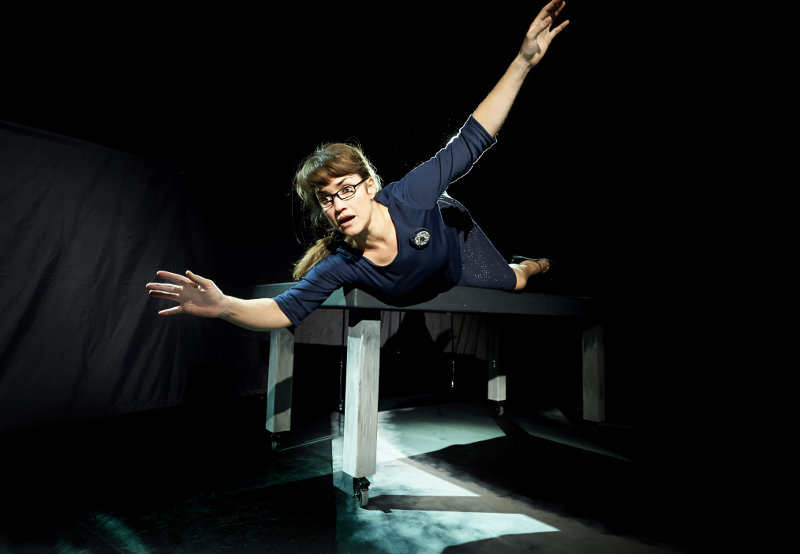In Stillpoint’s Moon Project there is good chemistry between Rachel Blackman’s character Leilah, and Jules Munns’ Shahab, demonstrated through language and physicality. He is soft and languid, she is tense and jerky; the way they move illustrates their differences and is a strong visual metaphor for the ensuing action.
Moon Project is about a collision and the effects that it has on those involved. It is also about being far from home and family, the nature of love, and what a person wants from life.
Leilah works in the bowels of a building, a museum, and in her black two-piece and glasses seems yearning to find light and flight. She has attempted that – a hang-gliding class – but couldn’t take the leap. Shahab has travelled widely, leaving family in Iran and settling in Britain for reasons he can’t explain, even to himself. He seeks companionship, through a series of women, but can’t find love.
When he flings Leilah into the universe via the bonnet of his car, he does a runner. That’s what he does.
Stillpoint puts movement at the centre of its productions; it’s the form through which narrative and character grow. At times it is a great shorthand and captures an idea or conveys a thought with graceful economy. But it can shift into unnecessary mime. Not every gesture – phone calls, eating – needs to be so sharply defined. It becomes a distraction, largely because the acting is so good. Rachel Blackman is compelling as Leilah, releasing her pent up knowledge and passion without entirely letting go. Jules Munn is convincing too, making a hit-and-run driver a sympathetic character.
The dialogue is cracking; witty and natural and not over-explanatory. There is a lot to explain, rather too much in fact. Moon Project is multi-layered and struggles a bit to get everything in; Leilah’s metallurgist father, Shahab’s mixed parentage, his poetry and her obsession with space travel. Whilst this keeps an audience on its toes, some of the backstory feels superfluous.
Structurally the piece works well, first defining the characters then gradually bringing these two very different people together. The hospital scene, whilst pivotal, is over-long. It provides a change of pace but creates a dip. Greg Mickelborough’s lighting in this scene is very effective, and is good throughout. There is a good choice of songs and sounds by the company.
It’s the relationship of the two that forms the heart of the play. As they inch towards a relationship, we kind of want Leilah to let her hair down, but Moon Project has others ideas. It fast forwards to 2019, to Leilah and Shahab as friends leading separate lives, each having found what they needed from life, each still looking to the stars.


